Economics for Business: Tesco, Sainsbury, and Brexit Analysis
VerifiedAdded on 2019/12/18
|8
|2351
|159
Report
AI Summary
This economics report provides an in-depth analysis of various factors impacting businesses in the UK. It begins by discussing the importance of business diversification, particularly through mergers and acquisitions, using Tesco as a case study. The report then examines the effects of changes in the micro business environment on Sainsbury, highlighting the influence of competitors and customer behavior. Finally, it assesses the impact of Brexit on UK business organizations, considering factors such as currency devaluation, import costs, and export challenges. The report concludes that while Brexit presents both challenges and opportunities, it will significantly affect the UK's economic landscape, including foreign direct investment, inflation, and employment. The report also highlights the need for businesses to adapt to changing market conditions and make strategic decisions to ensure success.
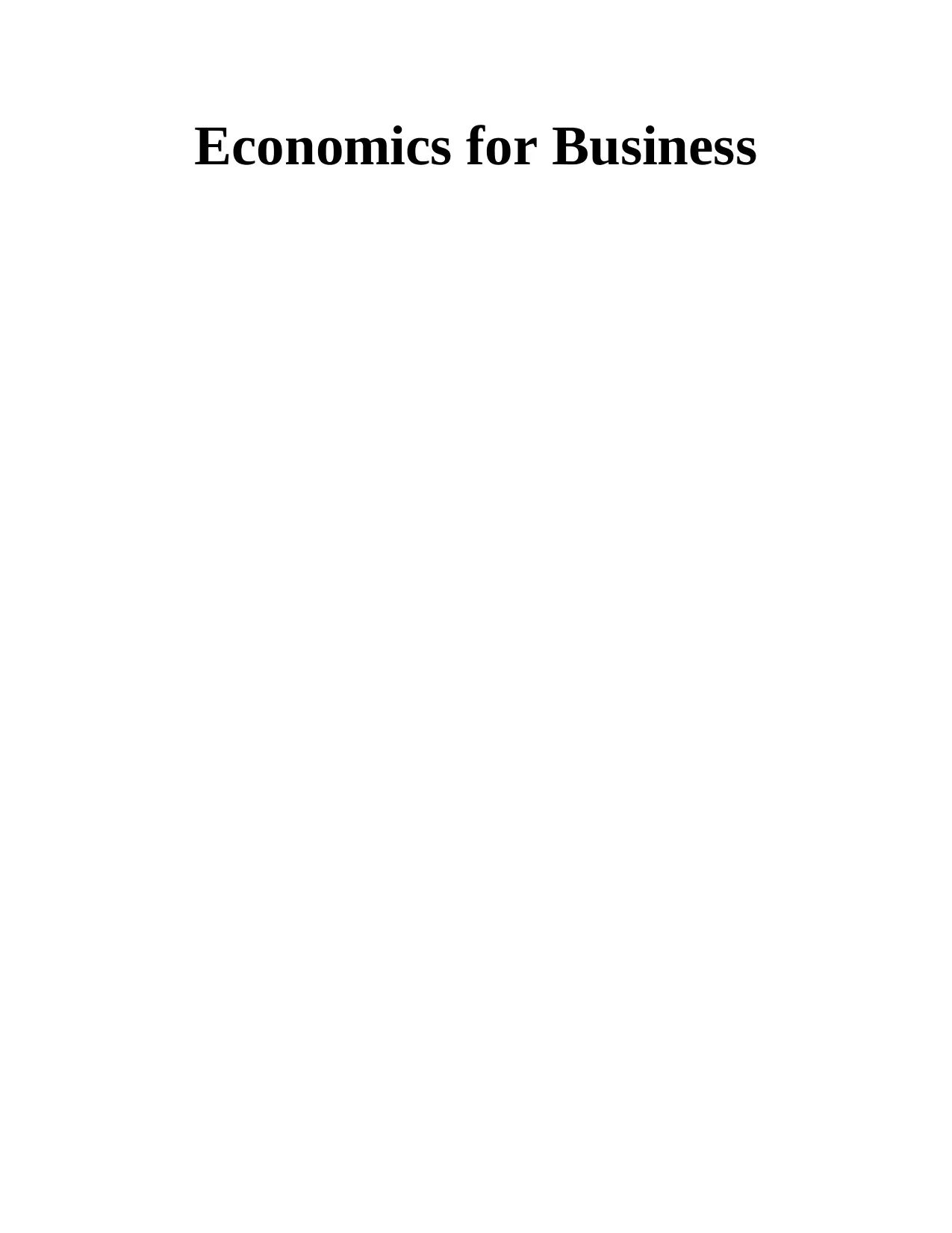
Economics for Business
Paraphrase This Document
Need a fresh take? Get an instant paraphrase of this document with our AI Paraphraser
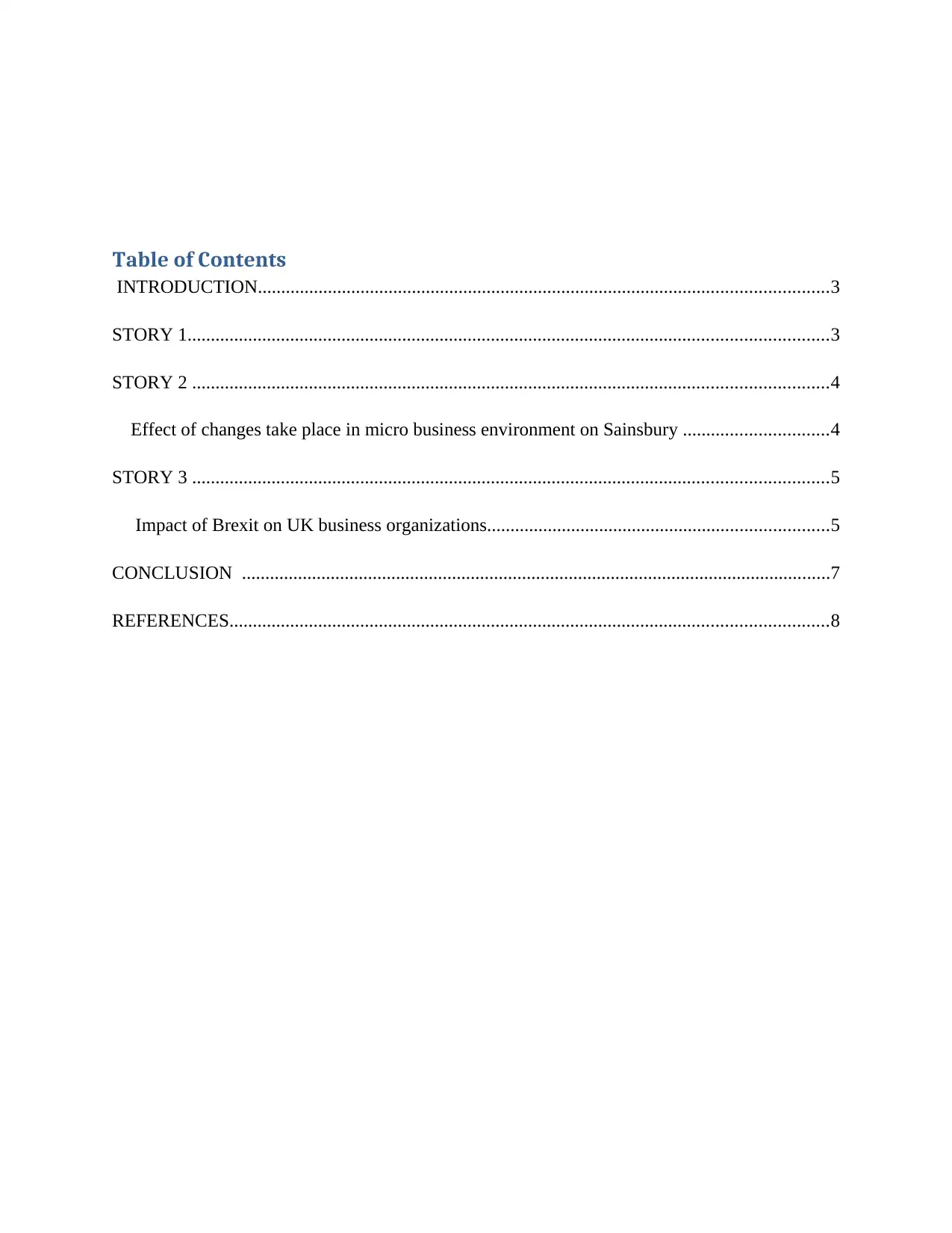
Table of Contents
INTRODUCTION..........................................................................................................................3
STORY 1.........................................................................................................................................3
STORY 2 ........................................................................................................................................4
Effect of changes take place in micro business environment on Sainsbury ...............................4
STORY 3 ........................................................................................................................................5
Impact of Brexit on UK business organizations.........................................................................5
CONCLUSION ..............................................................................................................................7
REFERENCES................................................................................................................................8
INTRODUCTION..........................................................................................................................3
STORY 1.........................................................................................................................................3
STORY 2 ........................................................................................................................................4
Effect of changes take place in micro business environment on Sainsbury ...............................4
STORY 3 ........................................................................................................................................5
Impact of Brexit on UK business organizations.........................................................................5
CONCLUSION ..............................................................................................................................7
REFERENCES................................................................................................................................8
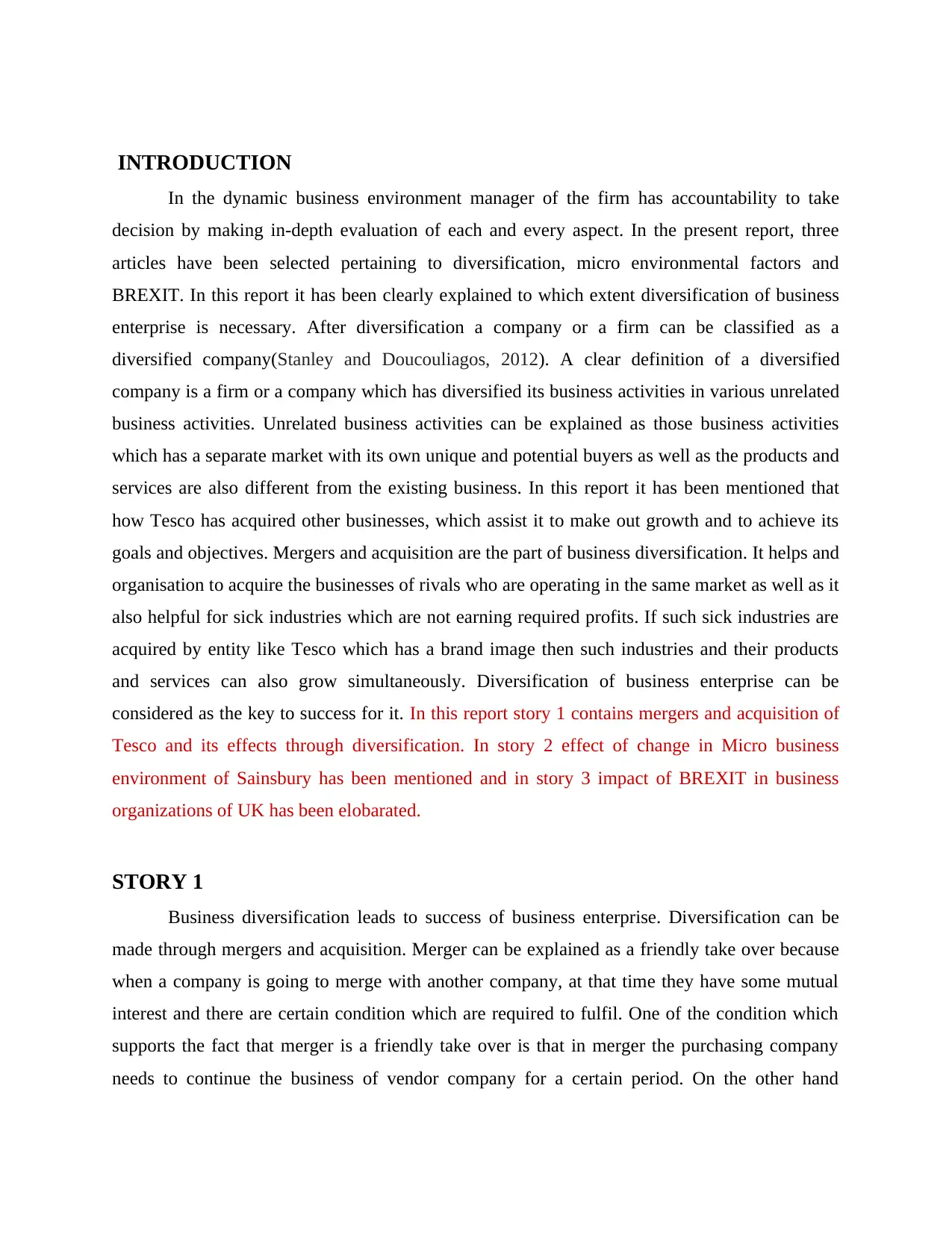
INTRODUCTION
In the dynamic business environment manager of the firm has accountability to take
decision by making in-depth evaluation of each and every aspect. In the present report, three
articles have been selected pertaining to diversification, micro environmental factors and
BREXIT. In this report it has been clearly explained to which extent diversification of business
enterprise is necessary. After diversification a company or a firm can be classified as a
diversified company(Stanley and Doucouliagos, 2012). A clear definition of a diversified
company is a firm or a company which has diversified its business activities in various unrelated
business activities. Unrelated business activities can be explained as those business activities
which has a separate market with its own unique and potential buyers as well as the products and
services are also different from the existing business. In this report it has been mentioned that
how Tesco has acquired other businesses, which assist it to make out growth and to achieve its
goals and objectives. Mergers and acquisition are the part of business diversification. It helps and
organisation to acquire the businesses of rivals who are operating in the same market as well as it
also helpful for sick industries which are not earning required profits. If such sick industries are
acquired by entity like Tesco which has a brand image then such industries and their products
and services can also grow simultaneously. Diversification of business enterprise can be
considered as the key to success for it. In this report story 1 contains mergers and acquisition of
Tesco and its effects through diversification. In story 2 effect of change in Micro business
environment of Sainsbury has been mentioned and in story 3 impact of BREXIT in business
organizations of UK has been elobarated.
STORY 1
Business diversification leads to success of business enterprise. Diversification can be
made through mergers and acquisition. Merger can be explained as a friendly take over because
when a company is going to merge with another company, at that time they have some mutual
interest and there are certain condition which are required to fulfil. One of the condition which
supports the fact that merger is a friendly take over is that in merger the purchasing company
needs to continue the business of vendor company for a certain period. On the other hand
In the dynamic business environment manager of the firm has accountability to take
decision by making in-depth evaluation of each and every aspect. In the present report, three
articles have been selected pertaining to diversification, micro environmental factors and
BREXIT. In this report it has been clearly explained to which extent diversification of business
enterprise is necessary. After diversification a company or a firm can be classified as a
diversified company(Stanley and Doucouliagos, 2012). A clear definition of a diversified
company is a firm or a company which has diversified its business activities in various unrelated
business activities. Unrelated business activities can be explained as those business activities
which has a separate market with its own unique and potential buyers as well as the products and
services are also different from the existing business. In this report it has been mentioned that
how Tesco has acquired other businesses, which assist it to make out growth and to achieve its
goals and objectives. Mergers and acquisition are the part of business diversification. It helps and
organisation to acquire the businesses of rivals who are operating in the same market as well as it
also helpful for sick industries which are not earning required profits. If such sick industries are
acquired by entity like Tesco which has a brand image then such industries and their products
and services can also grow simultaneously. Diversification of business enterprise can be
considered as the key to success for it. In this report story 1 contains mergers and acquisition of
Tesco and its effects through diversification. In story 2 effect of change in Micro business
environment of Sainsbury has been mentioned and in story 3 impact of BREXIT in business
organizations of UK has been elobarated.
STORY 1
Business diversification leads to success of business enterprise. Diversification can be
made through mergers and acquisition. Merger can be explained as a friendly take over because
when a company is going to merge with another company, at that time they have some mutual
interest and there are certain condition which are required to fulfil. One of the condition which
supports the fact that merger is a friendly take over is that in merger the purchasing company
needs to continue the business of vendor company for a certain period. On the other hand
⊘ This is a preview!⊘
Do you want full access?
Subscribe today to unlock all pages.

Trusted by 1+ million students worldwide
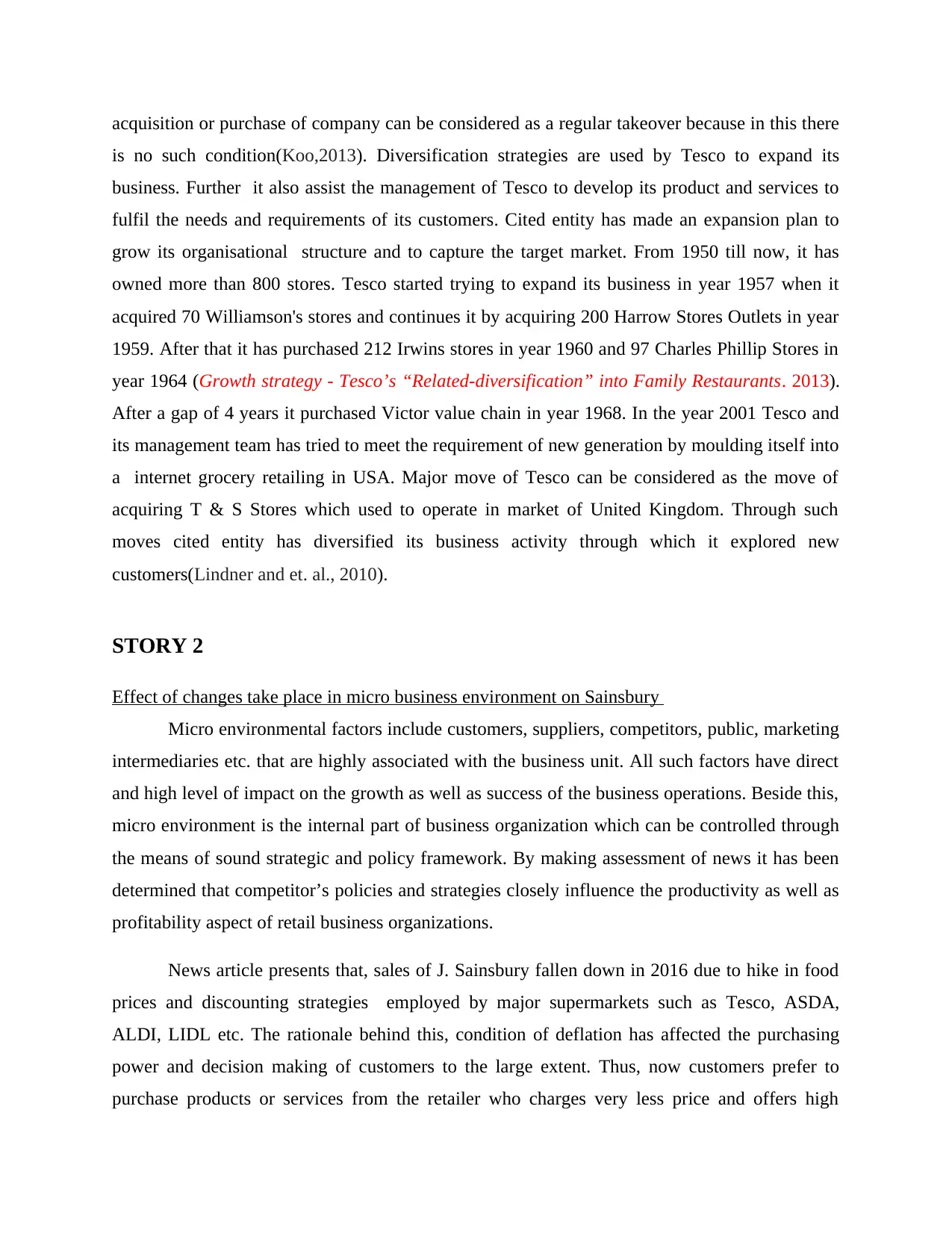
acquisition or purchase of company can be considered as a regular takeover because in this there
is no such condition(Koo,2013). Diversification strategies are used by Tesco to expand its
business. Further it also assist the management of Tesco to develop its product and services to
fulfil the needs and requirements of its customers. Cited entity has made an expansion plan to
grow its organisational structure and to capture the target market. From 1950 till now, it has
owned more than 800 stores. Tesco started trying to expand its business in year 1957 when it
acquired 70 Williamson's stores and continues it by acquiring 200 Harrow Stores Outlets in year
1959. After that it has purchased 212 Irwins stores in year 1960 and 97 Charles Phillip Stores in
year 1964 (Growth strategy - Tesco’s “Related-diversification” into Family Restaurants. 2013).
After a gap of 4 years it purchased Victor value chain in year 1968. In the year 2001 Tesco and
its management team has tried to meet the requirement of new generation by moulding itself into
a internet grocery retailing in USA. Major move of Tesco can be considered as the move of
acquiring T & S Stores which used to operate in market of United Kingdom. Through such
moves cited entity has diversified its business activity through which it explored new
customers(Lindner and et. al., 2010).
STORY 2
Effect of changes take place in micro business environment on Sainsbury
Micro environmental factors include customers, suppliers, competitors, public, marketing
intermediaries etc. that are highly associated with the business unit. All such factors have direct
and high level of impact on the growth as well as success of the business operations. Beside this,
micro environment is the internal part of business organization which can be controlled through
the means of sound strategic and policy framework. By making assessment of news it has been
determined that competitor’s policies and strategies closely influence the productivity as well as
profitability aspect of retail business organizations.
News article presents that, sales of J. Sainsbury fallen down in 2016 due to hike in food
prices and discounting strategies employed by major supermarkets such as Tesco, ASDA,
ALDI, LIDL etc. The rationale behind this, condition of deflation has affected the purchasing
power and decision making of customers to the large extent. Thus, now customers prefer to
purchase products or services from the retailer who charges very less price and offers high
is no such condition(Koo,2013). Diversification strategies are used by Tesco to expand its
business. Further it also assist the management of Tesco to develop its product and services to
fulfil the needs and requirements of its customers. Cited entity has made an expansion plan to
grow its organisational structure and to capture the target market. From 1950 till now, it has
owned more than 800 stores. Tesco started trying to expand its business in year 1957 when it
acquired 70 Williamson's stores and continues it by acquiring 200 Harrow Stores Outlets in year
1959. After that it has purchased 212 Irwins stores in year 1960 and 97 Charles Phillip Stores in
year 1964 (Growth strategy - Tesco’s “Related-diversification” into Family Restaurants. 2013).
After a gap of 4 years it purchased Victor value chain in year 1968. In the year 2001 Tesco and
its management team has tried to meet the requirement of new generation by moulding itself into
a internet grocery retailing in USA. Major move of Tesco can be considered as the move of
acquiring T & S Stores which used to operate in market of United Kingdom. Through such
moves cited entity has diversified its business activity through which it explored new
customers(Lindner and et. al., 2010).
STORY 2
Effect of changes take place in micro business environment on Sainsbury
Micro environmental factors include customers, suppliers, competitors, public, marketing
intermediaries etc. that are highly associated with the business unit. All such factors have direct
and high level of impact on the growth as well as success of the business operations. Beside this,
micro environment is the internal part of business organization which can be controlled through
the means of sound strategic and policy framework. By making assessment of news it has been
determined that competitor’s policies and strategies closely influence the productivity as well as
profitability aspect of retail business organizations.
News article presents that, sales of J. Sainsbury fallen down in 2016 due to hike in food
prices and discounting strategies employed by major supermarkets such as Tesco, ASDA,
ALDI, LIDL etc. The rationale behind this, condition of deflation has affected the purchasing
power and decision making of customers to the large extent. Thus, now customers prefer to
purchase products or services from the retailer who charges very less price and offers high
Paraphrase This Document
Need a fresh take? Get an instant paraphrase of this document with our AI Paraphraser
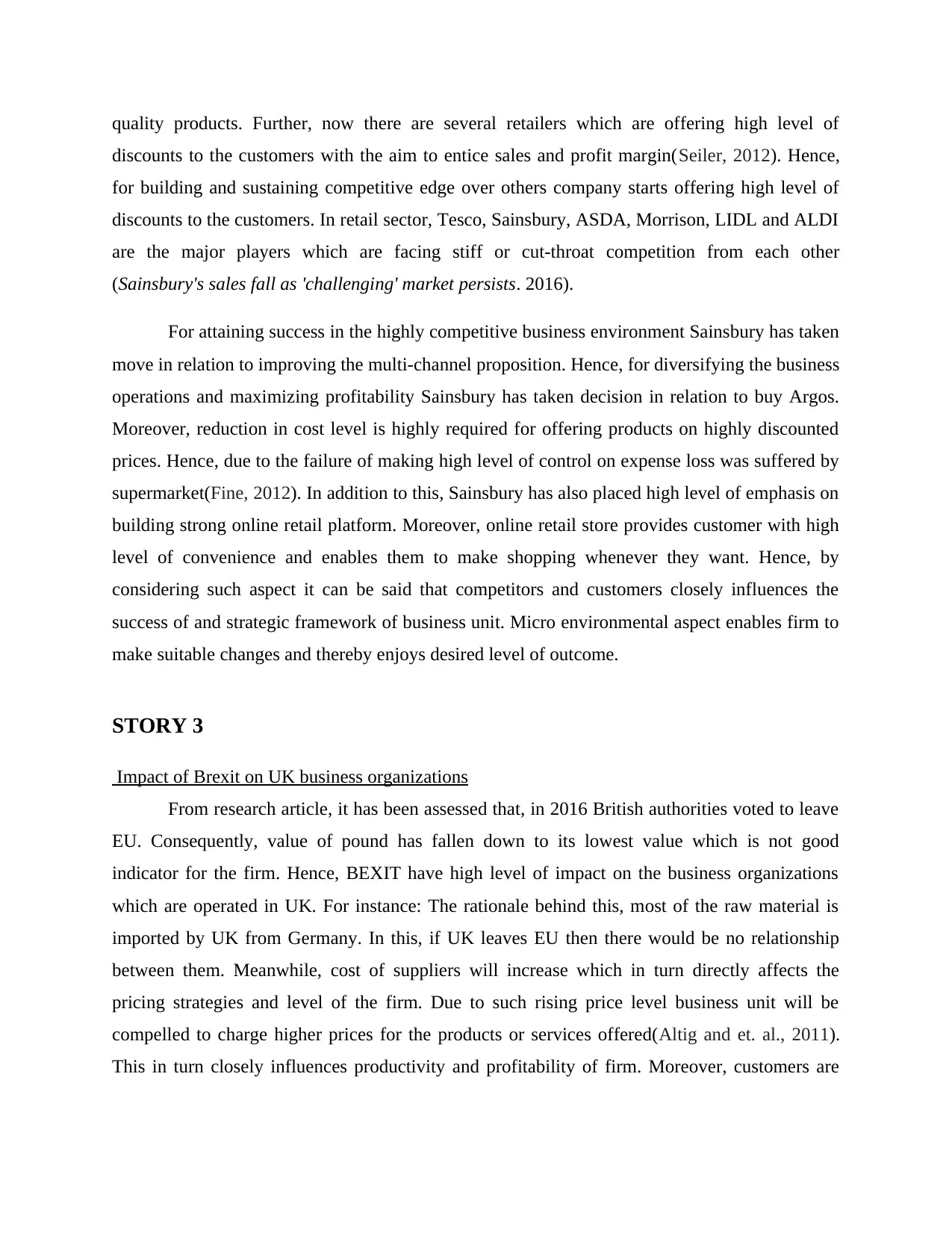
quality products. Further, now there are several retailers which are offering high level of
discounts to the customers with the aim to entice sales and profit margin(Seiler, 2012). Hence,
for building and sustaining competitive edge over others company starts offering high level of
discounts to the customers. In retail sector, Tesco, Sainsbury, ASDA, Morrison, LIDL and ALDI
are the major players which are facing stiff or cut-throat competition from each other
(Sainsbury's sales fall as 'challenging' market persists. 2016).
For attaining success in the highly competitive business environment Sainsbury has taken
move in relation to improving the multi-channel proposition. Hence, for diversifying the business
operations and maximizing profitability Sainsbury has taken decision in relation to buy Argos.
Moreover, reduction in cost level is highly required for offering products on highly discounted
prices. Hence, due to the failure of making high level of control on expense loss was suffered by
supermarket(Fine, 2012). In addition to this, Sainsbury has also placed high level of emphasis on
building strong online retail platform. Moreover, online retail store provides customer with high
level of convenience and enables them to make shopping whenever they want. Hence, by
considering such aspect it can be said that competitors and customers closely influences the
success of and strategic framework of business unit. Micro environmental aspect enables firm to
make suitable changes and thereby enjoys desired level of outcome.
STORY 3
Impact of Brexit on UK business organizations
From research article, it has been assessed that, in 2016 British authorities voted to leave
EU. Consequently, value of pound has fallen down to its lowest value which is not good
indicator for the firm. Hence, BEXIT have high level of impact on the business organizations
which are operated in UK. For instance: The rationale behind this, most of the raw material is
imported by UK from Germany. In this, if UK leaves EU then there would be no relationship
between them. Meanwhile, cost of suppliers will increase which in turn directly affects the
pricing strategies and level of the firm. Due to such rising price level business unit will be
compelled to charge higher prices for the products or services offered(Altig and et. al., 2011).
This in turn closely influences productivity and profitability of firm. Moreover, customers are
discounts to the customers with the aim to entice sales and profit margin(Seiler, 2012). Hence,
for building and sustaining competitive edge over others company starts offering high level of
discounts to the customers. In retail sector, Tesco, Sainsbury, ASDA, Morrison, LIDL and ALDI
are the major players which are facing stiff or cut-throat competition from each other
(Sainsbury's sales fall as 'challenging' market persists. 2016).
For attaining success in the highly competitive business environment Sainsbury has taken
move in relation to improving the multi-channel proposition. Hence, for diversifying the business
operations and maximizing profitability Sainsbury has taken decision in relation to buy Argos.
Moreover, reduction in cost level is highly required for offering products on highly discounted
prices. Hence, due to the failure of making high level of control on expense loss was suffered by
supermarket(Fine, 2012). In addition to this, Sainsbury has also placed high level of emphasis on
building strong online retail platform. Moreover, online retail store provides customer with high
level of convenience and enables them to make shopping whenever they want. Hence, by
considering such aspect it can be said that competitors and customers closely influences the
success of and strategic framework of business unit. Micro environmental aspect enables firm to
make suitable changes and thereby enjoys desired level of outcome.
STORY 3
Impact of Brexit on UK business organizations
From research article, it has been assessed that, in 2016 British authorities voted to leave
EU. Consequently, value of pound has fallen down to its lowest value which is not good
indicator for the firm. Hence, BEXIT have high level of impact on the business organizations
which are operated in UK. For instance: The rationale behind this, most of the raw material is
imported by UK from Germany. In this, if UK leaves EU then there would be no relationship
between them. Meanwhile, cost of suppliers will increase which in turn directly affects the
pricing strategies and level of the firm. Due to such rising price level business unit will be
compelled to charge higher prices for the products or services offered(Altig and et. al., 2011).
This in turn closely influences productivity and profitability of firm. Moreover, customers are
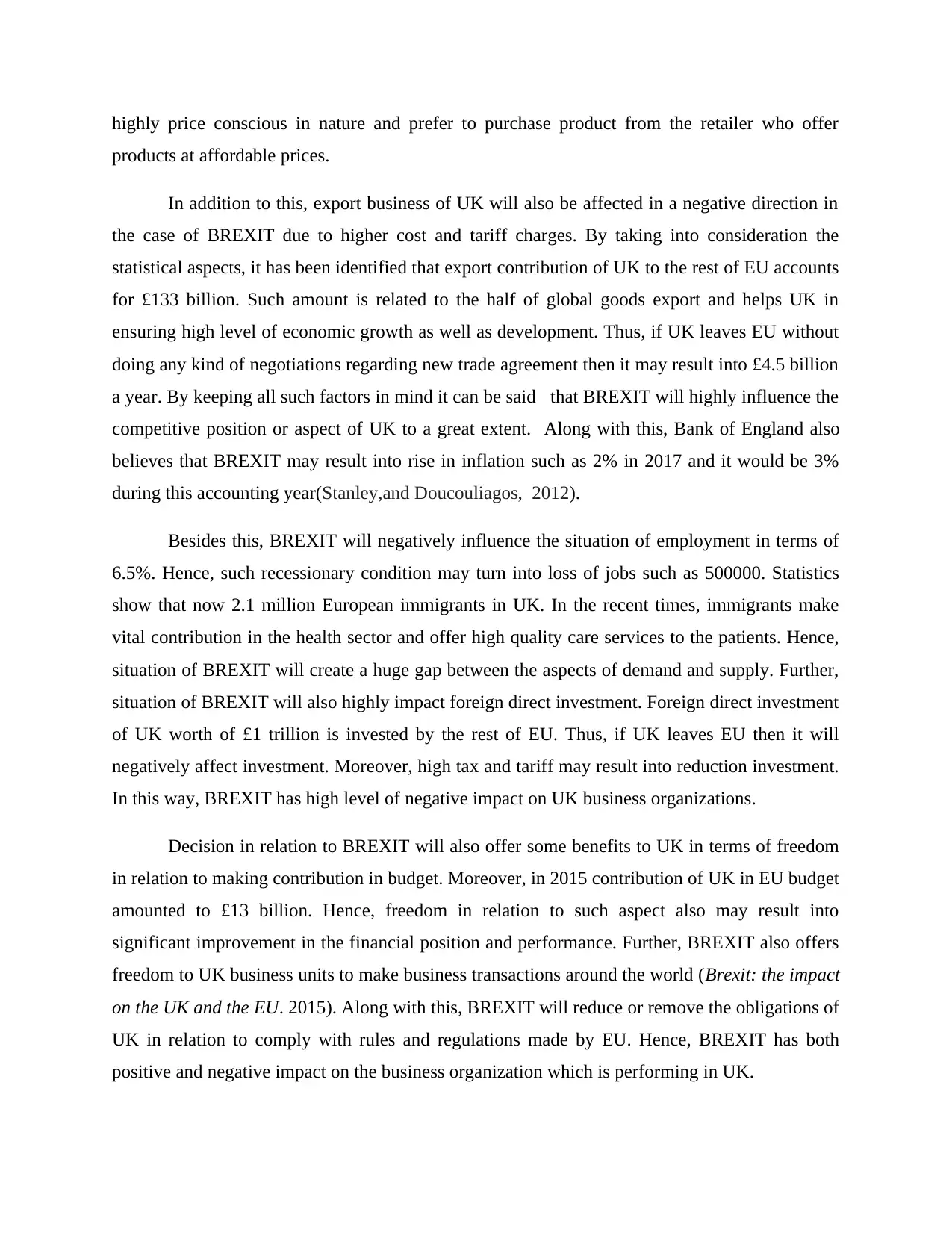
highly price conscious in nature and prefer to purchase product from the retailer who offer
products at affordable prices.
In addition to this, export business of UK will also be affected in a negative direction in
the case of BREXIT due to higher cost and tariff charges. By taking into consideration the
statistical aspects, it has been identified that export contribution of UK to the rest of EU accounts
for £133 billion. Such amount is related to the half of global goods export and helps UK in
ensuring high level of economic growth as well as development. Thus, if UK leaves EU without
doing any kind of negotiations regarding new trade agreement then it may result into £4.5 billion
a year. By keeping all such factors in mind it can be said that BREXIT will highly influence the
competitive position or aspect of UK to a great extent. Along with this, Bank of England also
believes that BREXIT may result into rise in inflation such as 2% in 2017 and it would be 3%
during this accounting year(Stanley,and Doucouliagos, 2012).
Besides this, BREXIT will negatively influence the situation of employment in terms of
6.5%. Hence, such recessionary condition may turn into loss of jobs such as 500000. Statistics
show that now 2.1 million European immigrants in UK. In the recent times, immigrants make
vital contribution in the health sector and offer high quality care services to the patients. Hence,
situation of BREXIT will create a huge gap between the aspects of demand and supply. Further,
situation of BREXIT will also highly impact foreign direct investment. Foreign direct investment
of UK worth of £1 trillion is invested by the rest of EU. Thus, if UK leaves EU then it will
negatively affect investment. Moreover, high tax and tariff may result into reduction investment.
In this way, BREXIT has high level of negative impact on UK business organizations.
Decision in relation to BREXIT will also offer some benefits to UK in terms of freedom
in relation to making contribution in budget. Moreover, in 2015 contribution of UK in EU budget
amounted to £13 billion. Hence, freedom in relation to such aspect also may result into
significant improvement in the financial position and performance. Further, BREXIT also offers
freedom to UK business units to make business transactions around the world (Brexit: the impact
on the UK and the EU. 2015). Along with this, BREXIT will reduce or remove the obligations of
UK in relation to comply with rules and regulations made by EU. Hence, BREXIT has both
positive and negative impact on the business organization which is performing in UK.
products at affordable prices.
In addition to this, export business of UK will also be affected in a negative direction in
the case of BREXIT due to higher cost and tariff charges. By taking into consideration the
statistical aspects, it has been identified that export contribution of UK to the rest of EU accounts
for £133 billion. Such amount is related to the half of global goods export and helps UK in
ensuring high level of economic growth as well as development. Thus, if UK leaves EU without
doing any kind of negotiations regarding new trade agreement then it may result into £4.5 billion
a year. By keeping all such factors in mind it can be said that BREXIT will highly influence the
competitive position or aspect of UK to a great extent. Along with this, Bank of England also
believes that BREXIT may result into rise in inflation such as 2% in 2017 and it would be 3%
during this accounting year(Stanley,and Doucouliagos, 2012).
Besides this, BREXIT will negatively influence the situation of employment in terms of
6.5%. Hence, such recessionary condition may turn into loss of jobs such as 500000. Statistics
show that now 2.1 million European immigrants in UK. In the recent times, immigrants make
vital contribution in the health sector and offer high quality care services to the patients. Hence,
situation of BREXIT will create a huge gap between the aspects of demand and supply. Further,
situation of BREXIT will also highly impact foreign direct investment. Foreign direct investment
of UK worth of £1 trillion is invested by the rest of EU. Thus, if UK leaves EU then it will
negatively affect investment. Moreover, high tax and tariff may result into reduction investment.
In this way, BREXIT has high level of negative impact on UK business organizations.
Decision in relation to BREXIT will also offer some benefits to UK in terms of freedom
in relation to making contribution in budget. Moreover, in 2015 contribution of UK in EU budget
amounted to £13 billion. Hence, freedom in relation to such aspect also may result into
significant improvement in the financial position and performance. Further, BREXIT also offers
freedom to UK business units to make business transactions around the world (Brexit: the impact
on the UK and the EU. 2015). Along with this, BREXIT will reduce or remove the obligations of
UK in relation to comply with rules and regulations made by EU. Hence, BREXIT has both
positive and negative impact on the business organization which is performing in UK.
⊘ This is a preview!⊘
Do you want full access?
Subscribe today to unlock all pages.

Trusted by 1+ million students worldwide
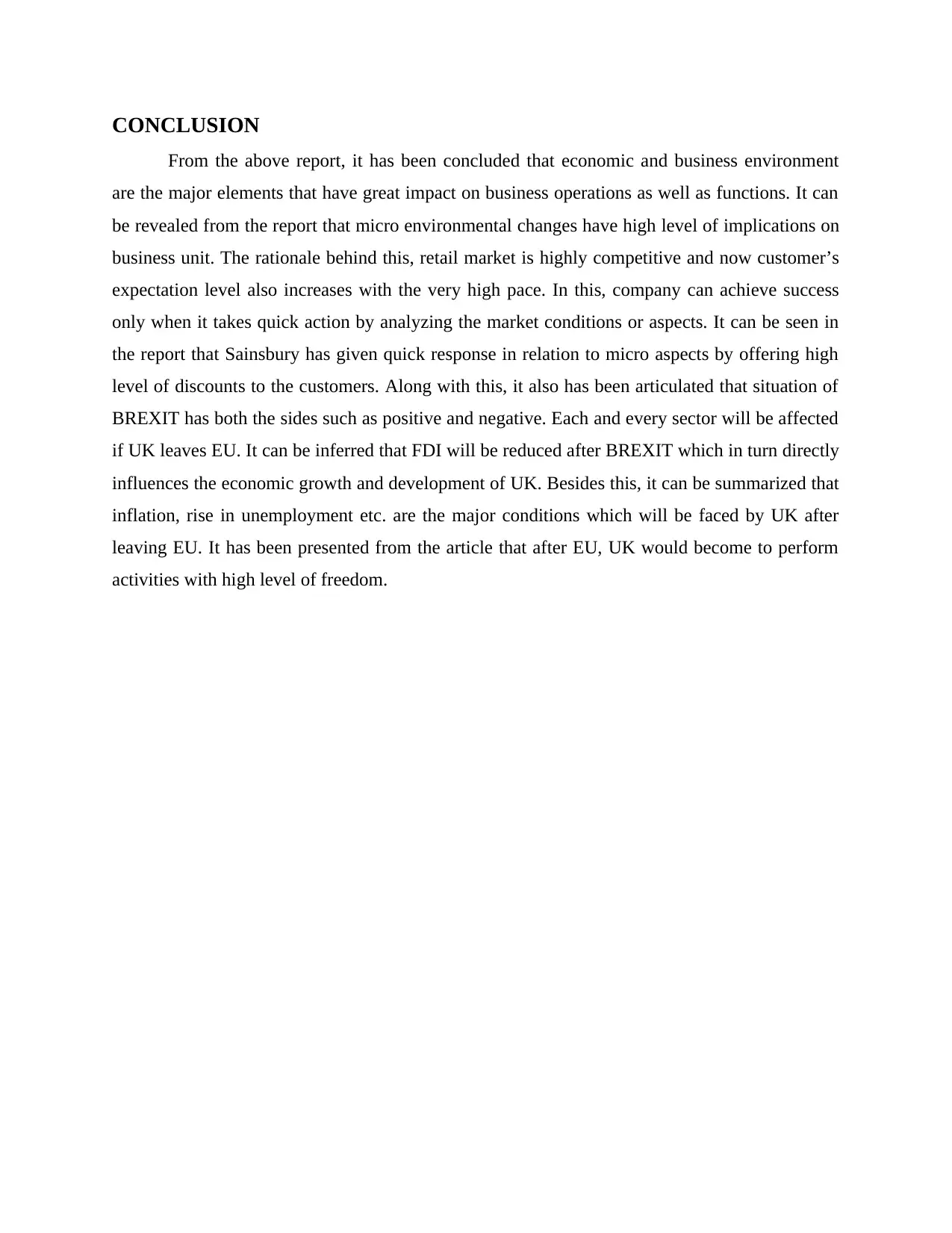
CONCLUSION
From the above report, it has been concluded that economic and business environment
are the major elements that have great impact on business operations as well as functions. It can
be revealed from the report that micro environmental changes have high level of implications on
business unit. The rationale behind this, retail market is highly competitive and now customer’s
expectation level also increases with the very high pace. In this, company can achieve success
only when it takes quick action by analyzing the market conditions or aspects. It can be seen in
the report that Sainsbury has given quick response in relation to micro aspects by offering high
level of discounts to the customers. Along with this, it also has been articulated that situation of
BREXIT has both the sides such as positive and negative. Each and every sector will be affected
if UK leaves EU. It can be inferred that FDI will be reduced after BREXIT which in turn directly
influences the economic growth and development of UK. Besides this, it can be summarized that
inflation, rise in unemployment etc. are the major conditions which will be faced by UK after
leaving EU. It has been presented from the article that after EU, UK would become to perform
activities with high level of freedom.
From the above report, it has been concluded that economic and business environment
are the major elements that have great impact on business operations as well as functions. It can
be revealed from the report that micro environmental changes have high level of implications on
business unit. The rationale behind this, retail market is highly competitive and now customer’s
expectation level also increases with the very high pace. In this, company can achieve success
only when it takes quick action by analyzing the market conditions or aspects. It can be seen in
the report that Sainsbury has given quick response in relation to micro aspects by offering high
level of discounts to the customers. Along with this, it also has been articulated that situation of
BREXIT has both the sides such as positive and negative. Each and every sector will be affected
if UK leaves EU. It can be inferred that FDI will be reduced after BREXIT which in turn directly
influences the economic growth and development of UK. Besides this, it can be summarized that
inflation, rise in unemployment etc. are the major conditions which will be faced by UK after
leaving EU. It has been presented from the article that after EU, UK would become to perform
activities with high level of freedom.
Paraphrase This Document
Need a fresh take? Get an instant paraphrase of this document with our AI Paraphraser
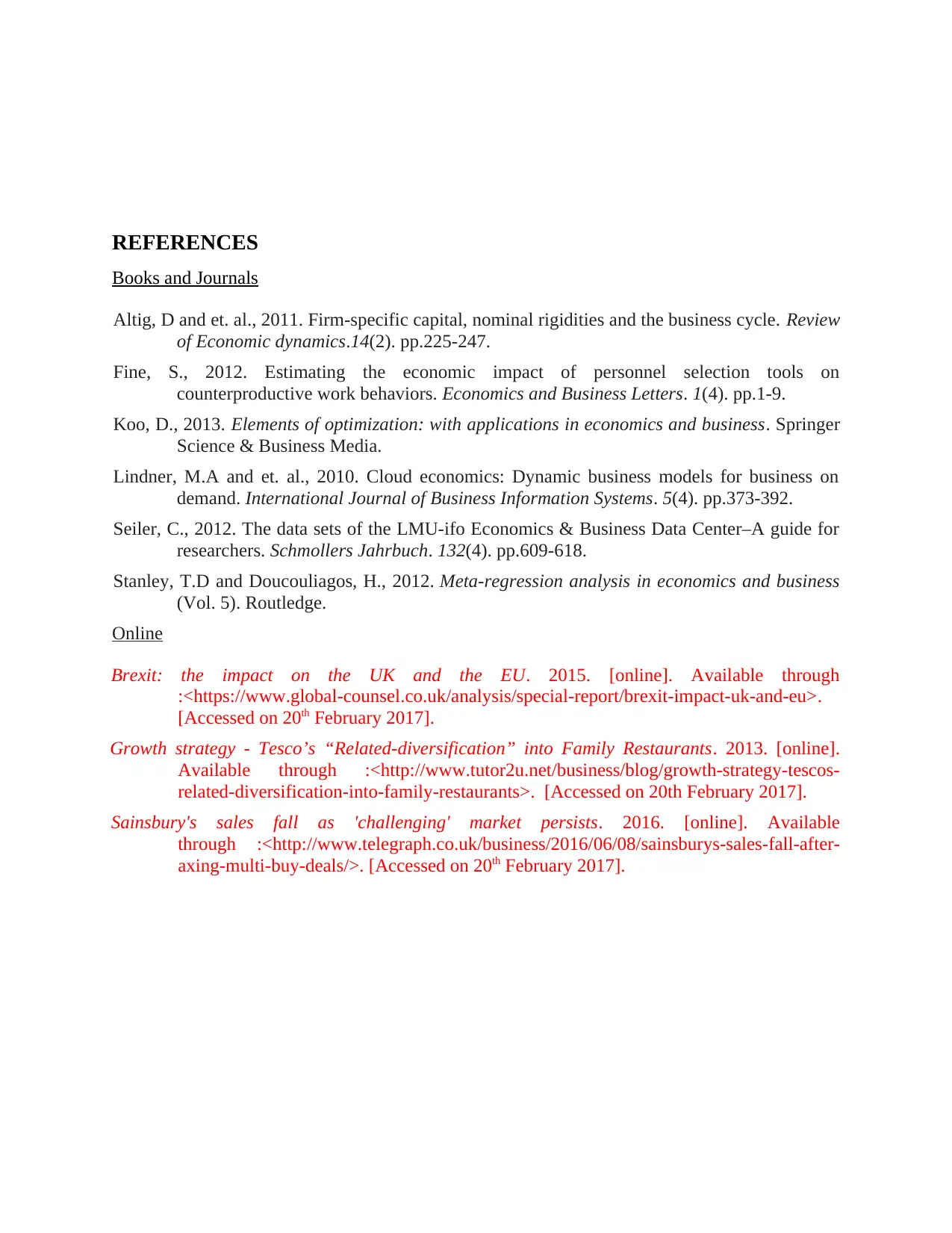
REFERENCES
Books and Journals
Altig, D and et. al., 2011. Firm-specific capital, nominal rigidities and the business cycle. Review
of Economic dynamics.14(2). pp.225-247.
Fine, S., 2012. Estimating the economic impact of personnel selection tools on
counterproductive work behaviors. Economics and Business Letters. 1(4). pp.1-9.
Koo, D., 2013. Elements of optimization: with applications in economics and business. Springer
Science & Business Media.
Lindner, M.A and et. al., 2010. Cloud economics: Dynamic business models for business on
demand. International Journal of Business Information Systems. 5(4). pp.373-392.
Seiler, C., 2012. The data sets of the LMU-ifo Economics & Business Data Center–A guide for
researchers. Schmollers Jahrbuch. 132(4). pp.609-618.
Stanley, T.D and Doucouliagos, H., 2012. Meta-regression analysis in economics and business
(Vol. 5). Routledge.
Online
Brexit: the impact on the UK and the EU. 2015. [online]. Available through
:<https://www.global-counsel.co.uk/analysis/special-report/brexit-impact-uk-and-eu>.
[Accessed on 20th February 2017].
Growth strategy - Tesco’s “Related-diversification” into Family Restaurants. 2013. [online].
Available through :<http://www.tutor2u.net/business/blog/growth-strategy-tescos-
related-diversification-into-family-restaurants>. [Accessed on 20th February 2017].
Sainsbury's sales fall as 'challenging' market persists. 2016. [online]. Available
through :<http://www.telegraph.co.uk/business/2016/06/08/sainsburys-sales-fall-after-
axing-multi-buy-deals/>. [Accessed on 20th February 2017].
Books and Journals
Altig, D and et. al., 2011. Firm-specific capital, nominal rigidities and the business cycle. Review
of Economic dynamics.14(2). pp.225-247.
Fine, S., 2012. Estimating the economic impact of personnel selection tools on
counterproductive work behaviors. Economics and Business Letters. 1(4). pp.1-9.
Koo, D., 2013. Elements of optimization: with applications in economics and business. Springer
Science & Business Media.
Lindner, M.A and et. al., 2010. Cloud economics: Dynamic business models for business on
demand. International Journal of Business Information Systems. 5(4). pp.373-392.
Seiler, C., 2012. The data sets of the LMU-ifo Economics & Business Data Center–A guide for
researchers. Schmollers Jahrbuch. 132(4). pp.609-618.
Stanley, T.D and Doucouliagos, H., 2012. Meta-regression analysis in economics and business
(Vol. 5). Routledge.
Online
Brexit: the impact on the UK and the EU. 2015. [online]. Available through
:<https://www.global-counsel.co.uk/analysis/special-report/brexit-impact-uk-and-eu>.
[Accessed on 20th February 2017].
Growth strategy - Tesco’s “Related-diversification” into Family Restaurants. 2013. [online].
Available through :<http://www.tutor2u.net/business/blog/growth-strategy-tescos-
related-diversification-into-family-restaurants>. [Accessed on 20th February 2017].
Sainsbury's sales fall as 'challenging' market persists. 2016. [online]. Available
through :<http://www.telegraph.co.uk/business/2016/06/08/sainsburys-sales-fall-after-
axing-multi-buy-deals/>. [Accessed on 20th February 2017].
1 out of 8
Related Documents
Your All-in-One AI-Powered Toolkit for Academic Success.
+13062052269
info@desklib.com
Available 24*7 on WhatsApp / Email
![[object Object]](/_next/static/media/star-bottom.7253800d.svg)
Unlock your academic potential
Copyright © 2020–2026 A2Z Services. All Rights Reserved. Developed and managed by ZUCOL.





